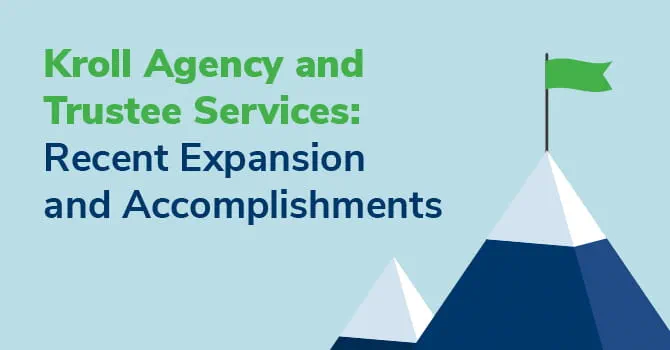
Business Services
Talk to a Kroll expert. Set up a meeting now.

Streamline your complex administrative needs with Kroll
When professional reputations and millions of dollars are on the line, clients turn to Kroll to simplify complex capital events by taking over the administrative burden, providing comprehensive capital structure services and managing payments, risk and more.
With a combination of highly experienced industry experts, innovative and proprietary technology platforms, and unrivaled data security measures, we provide scalable business solutions that span our clients’ full transaction life cycle. With processes that are designed for efficiency and accuracy, our approach ensures the highest standard of quality across all the industries we serve.
Global, end-to-end services
Kroll’s Business Services team works with companies and their advisors to provide technology-enabled solutions and expertise for the administration of corporate restructurings, legal settlements, capital structure transactions, agency and trustee services, and other business and legal support needs. We are the only provider able to deliver global turnkey services and unlimited scalability for mission-critical, complex matters.
Kroll Agency and Trustee Services – Recent Expansion and Accomplishments

Kroll Agency and Trustee Services – Recent Expansion and Accomplishments
As the leading provider of independent agency and trustee services to the global loan and bond markets, Kroll has expanded our Agency and Trustee Services practice to the U.S. market and welcomed several senior hires to our team to better serve our clients.
Valuation
Valuation of businesses, assets and alternative investments for financial reporting, tax and other purposes.
Cyber Risk
Incident response, digital forensics, breach notification, managed detection services, penetration testing, cyber assessments and advisory.
Compliance and Regulation
End-to-end governance, advisory and monitorship solutions to detect, mitigate and remediate security, legal, compliance and regulatory risk.
Corporate Finance and Restructuring
M&A advisory, restructuring and insolvency, debt advisory, strategic alternatives, transaction diligence and independent financial opinions.
Investigations and Disputes
World-wide expert services and tech-enabled advisory through all stages of diligence, forensic investigation, litigation, disputes and testimony.
Digital Technology Solutions
Enriching our professional services, our integrated software platform helps clients discover, quantify and manage risk in the corporate and private capital market ecosystem.
Business Services
Expert provider of complex administrative solutions for capital events globally. Our services include claims and noticing administration, debt restructuring and liability management services, agency and trustee services and more.
Environmental, Social and Governance
Advisory and technology solutions, including policies and procedures, screening and due diligence, disclosures and reporting and investigations, value creation, and monitoring.
Featured Insights
Settlement Administration | Case Study

The Kroll Lens: Monitoring Class Action Settlements
Outlook

10 Trends Shaping 2024
Settlement Administration
5 Ways to Easily Compare Class Action Settlement Administrator Proposals

Settlement Administration
The Successful Administration of an Assurance of Discontinuance
by Mark P. Rapazzini

Restructuring Administration
Restructuring Administration Case Study PG&E Corporation

Economic Outlook
One Year After Russia's War on Ukraine: What Have We Learned?








